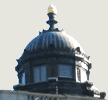In 1654, Portugal recaptured Brazil and expelled its Jewish settlers. Most returned to Holland or moved to Protestant-ruled colonies in the Caribbean. A group of 23 Jewish refugees arrived in New Amsterdam (New York City today) hoping to settle and build a new home for themselves. In the years that followed, the growing Jewish community pressed the authorities to extend to them rights offered to other settlers, including the right to trade and travel, stand guard, own property, establish a cemetery, erect a house of worship and participate fully in the political process.
For Jews, the promise of America was deeply rooted in its commitment to religious liberty. George Washington's declaration in 1790 to the Newport Hebrew Congregation that America gives "to bigotry no sanction, to persecution no assistance," provided the Jewish community with an early assurance of America's suitability as a haven.
"From Haven to Home: A Library of Congress Exhibition Marking 350 Years of Jewish Life in America" is now on view in the Library's Thomas Jefferson Building through Dec. 18. This exhibition is free and open to the public from 10 a.m. to 5 p.m., Monday-Saturday. If you can't come to Washington, you can view the exhibition online.
The exhibition features more than 200 treasures of American Judaica from the collections of the Library of Congress, augmented by a selection of important loans from other cooperating cultural institutions.



